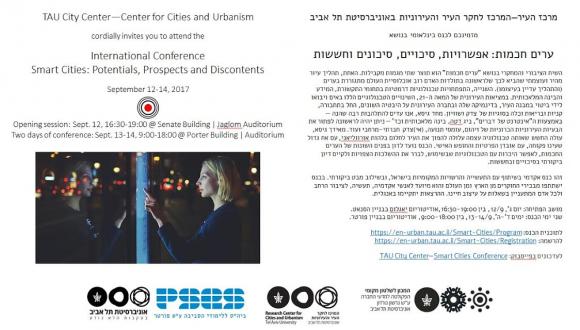כנס מרכז העיר - ערים חכמות
בימים ד' - ה' 13-14.9.2017 יארח בית הספר ללימודי הסביבה ע"ש פורטר את כנס ערים חכמות — אפשרויות, סיכויים, סיכונים וחששות של מרכז העיר - המרכז לחקר העיר והעירוניות באוניברסיטת תל אביב.
הכנס יתקיים בקומת האודיטוריום של בית הספר.
במסגרת הכנס, תדבר ד"ר אורלי רונן, ראש המעבדה לחדשנות ולקיימות עירונית. בנושא Towards a new urban agenda, Habitat III: From public participation to civic engagement. יום ה', 14.9, 15:00-15:45
לפרטים נוספים:
"מרכז העיר" – המרכז לחקר העיר והעירוניות באוניברסיטת תל אביב
תוכנית הכנס: https://en-urban.tau.ac.il/Smart-Cities/Program
לעדכונים בפייסבוק: Smart Cities Conference - TAU City Center
The smartification of cities implies an integration of the real and virtual worlds by means of AI (Artificial Intelligence) artifacts that imitate and simulate cognitive capabilities such as learning and rational decision making. These have the potential to revolutionize the dynamics and structure of cities and the lives of those who inhabit them. There is therefore great enthusiasm that ICT (Information and Communication Technologies) and IoT (Internet of Things) – with their big data and data mining methodologies – will make the control, planning and governance of cities more efficient, just, sustainable and resilient than ever before, and will thus solve chronic urban problems such as traffic jams, environmental pollution and the like. At the same time, there is also skepticism that over-efficient urban planning and control have the potential to transform our cities into an Orwellian nightmare.
Smart cities are also currently discussed in the context of CTC (Complexity Theories of Cities) – a domain of research that applies the various theories of complexity as a means to study and model the dynamics of cities. What is still missing in the general smart cities discourse as well as in the context of CTC concerns the implications to urban dynamics; namely, a response to questions such as: How can smart artifacts that partly imitate learning and rational decision-making affect the various urban processes? How to model such a real-virtual city? What is an ‘urban agent’ in such a context? Can the ‘things’ of IoT be considered agents?
City Center’s ‘International Conference on Smart Cities: Potentials, Prospects and Discontents’ will comparatively discuss these and other questions and aspects of smart cities, and will thus explicate their potentials, prospects and discontents in general and in the specific reality of Israeli society.


